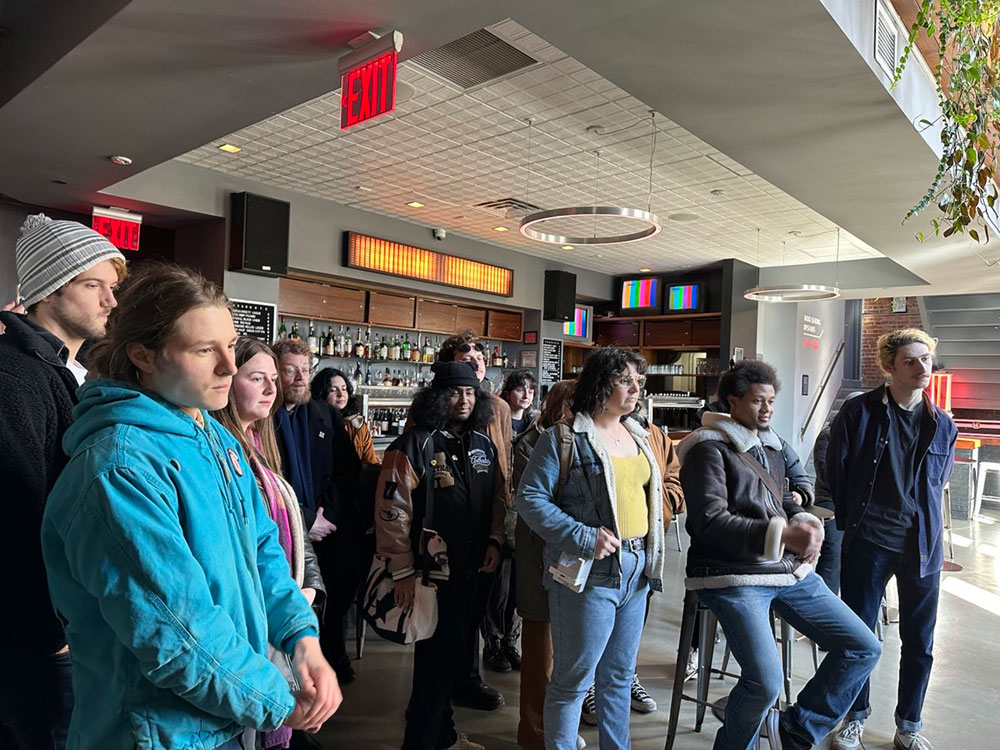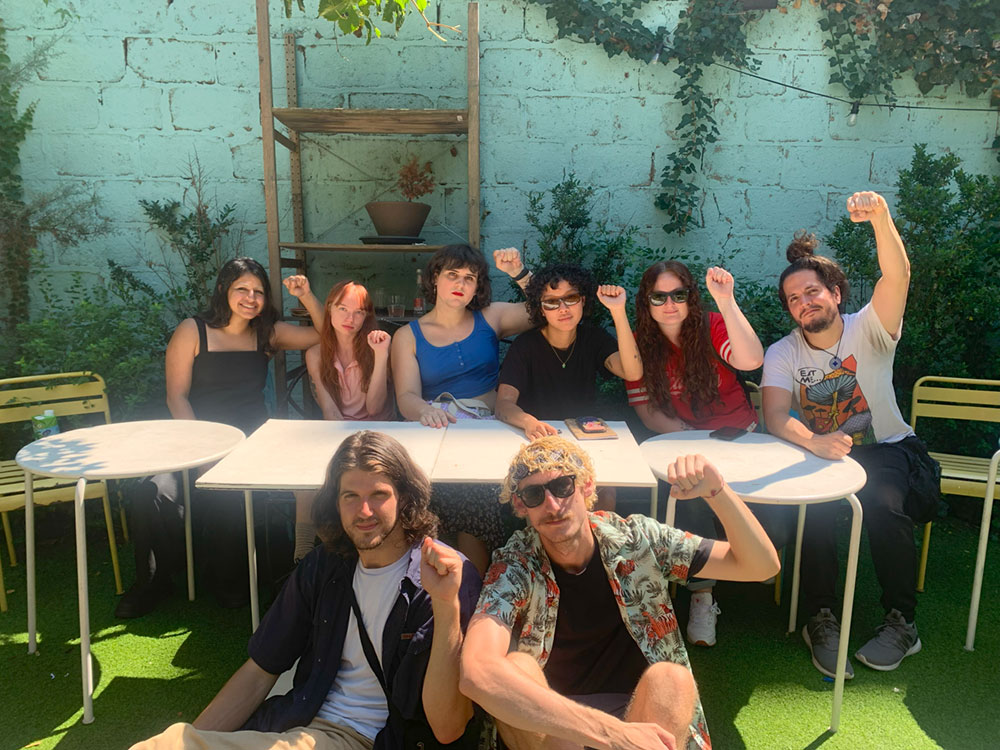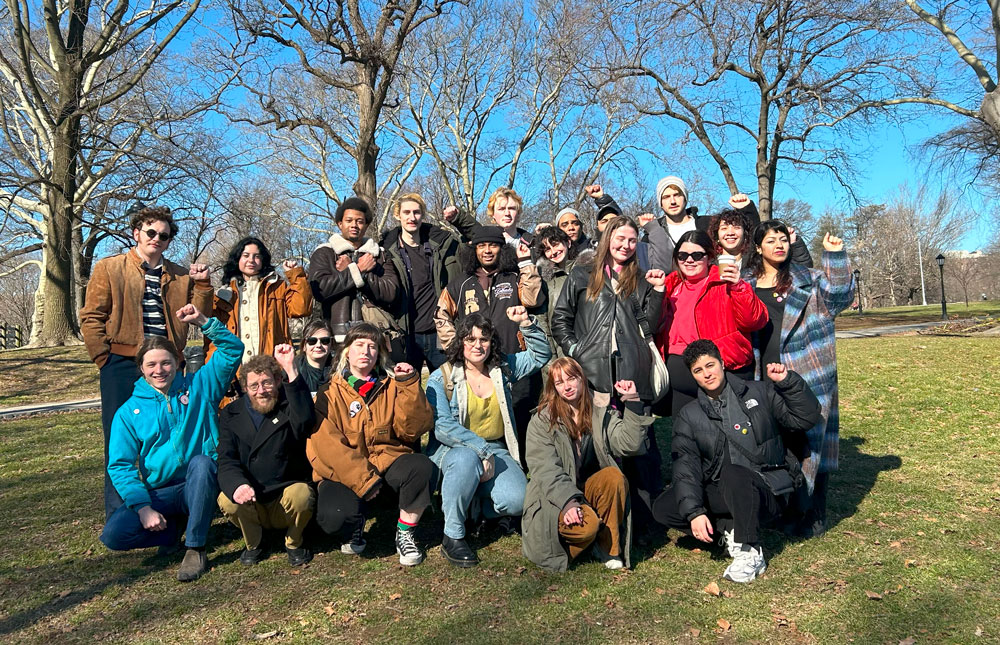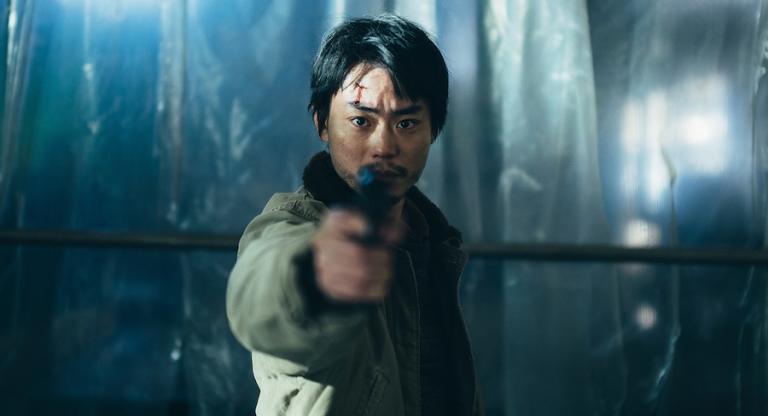If you’re a New York City moviegoer and a reader of Screen Slate, there’s a decent chance you’ve seen a movie at Nitehawk Prospect Park, which hosts both new releases and a great deal of repertory films, many of which are presented on 35mm. In which case, you’ve definitely interacted with, or at least witnessed, the theater’s hard-working staff, who are tasked with managing the flow of meals and checks to and from customers without interrupting the film-viewing experience—all under the cover of darkness. What you don’t see is the scramble behind-the-screens as cooks and bartenders prepare food and drinks for seven theaters of varying sizes at the same time, and the wait staff carry trays of refreshments up and down several floors through the 100-year-old building’s labyrinthine stairwells. It is this demanding labor and the lack of managerial consideration for workers’ concerns regarding safety, scheduling, and fair wages, that prompted the Nitehawk staff’s realization that what they needed was a union.
On February 6, 2024, the Nitehawk Workers Union officially announced themselves by delivering a letter to the theater’s managers outlining their primary demands for increased pay and benefits, consistency in shift scheduling, management accountability for making the workplace a safer environment, and protection against retaliation for raising concerns. Since management declined to voluntarily recognize their union, they filed for an election with the National Labor Relations Board (NLRB) the following day, with a supermajority support among the staff. The bargaining unit consists of over 100 full-time and part-time employees—including wait staff, bartenders, line cooks, and porters—and is represented by United Auto Workers Local 2179, the same local that represents NYC Alamo United. Nitehawk Workers Union is joining the small wave of movie theater unionizations that have developed over the past few years, which include workers at Film Forum, Anthology Film Archives, Film at Lincoln Center, BAM, and MoMA.
I spoke with Catherine Coradini and Sabrina Leira, both servers at Nitehawk Prospect Park and members of the Organizing Committee for the Nitehawk Workers Union about how the union formed, the larger labor struggle happening across all levels of the film industry, and of course, movies.
Stephanie Monohan: What were some of the key issues that you’ve been dealing with at Nitehawk that led to these initial discussions about unionizing? I know Barbenheimer has been cited as an event that provoked organizing conversations among theater workers.
Sabrina Leira: The Barbenheimer weeks were definitely an inciting incident, but it just brought to light a lot of problems that had been going on for years before and haven’t been addressed. I think in the movie industry specifically, the inconsistencies of the popularity of movies that are coming out really affects our business model. It’s not necessarily in a negative way, but I think management, in the way that they’re scheduling and the way that they’re compensating us, needs to be adaptable to that. If you have a really popular movie coming out, you have to prepare for that. If you know Dune: Part Two is coming out in March, maybe you should hire a couple more people, because it’s going to be a little busy. But then, the problem with that is that then a couple months later, when it gets slow again, we’re overstaffed. Then, they’re cutting people every day and not compensating people for their cut shifts. So there’s a lot of inconsistencies built into the business model that were kind of just being pushed to the side. As a result, workers are being affected in a lot of different ways: in scheduling, in their compensation, and in being overworked. When we tried to bring up these concerns to management in multiple different ways we were always met with, “Yeah, we hear you. We’re working on these things.” But, we’ve never seen significant changes.
Catherine Coradini: I would also like to piggyback on this. Management’s ideal route for us involves an anonymous virtual suggestion box, which is actually not anonymous, keeps the conversation away from our co-workers, and turns things into a one-on-one situation where we have absolutely no power in what is done, what is said, and how the problems we bring up are dealt with. I have never used it before, but my understanding is that it has happened in the past where people have submitted to the “anonymous virtual suggestion box” and then were met by management with their suggestion.
SM: I see movies at Prospect Park Nitehawk very frequently and something I’ve thought about a lot when I’m there is how the work that’s taking place is designed to be more invisible than at standard restaurants because of the focus on the film. When you dine out at a restaurant, the focus is on the meal and there’s a strong cognisance of the preparation involved, as well as the sustained customer-worker interaction throughout. But at a dine-in movie theater, I imagine the goal is to not interrupt the main focus, which is the film.
SL: I think a weird thing happens when you’re in the dark, where a sense of time goes away. I think it’s important for people to know that we are humans working and serving you. Also, the operation is so big. We have servers, food runners, bartenders, chefs, and porters in the back. We don’t just make the food right behind you and then bring it out to you—it’s a whole big operation. For the most part, I think that people understand that. But I hope that through our unionizing efforts, we’re able to bring the community of people that come to the theater together more.
CC: For customers, they might only see a runner or a server, but any plate or drink we give to them has gone through at least three or four other people. We’re sometimes serving 150 people at once as a team. And even when you have three to six people running your food, that is a high volume turnaround. It’s something people just don’t realize sometimes.

SM: Navigating the building itself seems to be its own unique challenge with the number of floors you’re going between, the stairwells, and sometimes slippery floors. What do you think needs to happen to make the building a safer place for everyone to be working in?
SL: It’s hard to answer this specifically because the way the building is built is so absurd. I think in terms of issues like the slippery floors—it’s happened multiple times where we don’t have air conditioning in a lot of the theaters or the service stations when it’s really hot—it’s about upper-management thinking about how it’s affecting service on our end and the customers—and, addressing it sooner. If a theater doesn’t have air conditioning and the floor is slippery, which has happened, shut the theater down until the problem is fixed. There was an instance of that where it was not addressed and it was dangerous for everyone involved.
CC: This specific issue has been ongoing. I started back in June, which was when we started seeing the rise of these problems for the season. Everyone was comparing it to Nope [2022] the previous summer [when] they were having the exact same problem. I’m sure when we get to this summer’s big movies, we’re gonna say, “Do you remember Nope? Do you remember Barbenheimer with the slippery floors? Do you remember falling down during Asteroid City [2023]?”
SM: How did the union’s initial conversation with management go and what has the dynamic been like since then?
CC: We gave them the opportunity to voluntarily recognize [us] on February 6. They discussed amongst themselves for 15 minutes and then said, “We can’t give you an answer at this time. We’re trying to figure it out. Have a good day.” We did hear back later that day from their lawyers that they will not voluntarily recognize and we’ve received messages from them that they do not want a union at Nitehawk.
SL: We don’t see upper-management or the owners very often, but this past week they’ve been around more even if they’re not talking to us. I went into this very hopeful that we would have good conversations with management about what the next steps are, and I think that’s still possible. As of now, things have been a bit tense but I’m hopeful that we’ll be able to move forward in a productive way that benefits everybody.
SM: How has it been building solidarity among workers when there’s so many different kinds of roles? The difference between front-of-house staff and a back-of-house staff can often be its own obstacle in workplace organizing, but at Nitehawk there’s also programmers and projectionists on the more film-focused side. Is there any conversation and collaboration even with workers who are not in the bargaining unit?
SL: Since going public, we’ve seen a lot of support from people on the cinema team, projectionists, and people who come in to host special events. It’s been really cool to see support from other people we work with, especially from the people on the more “movie industry” side of the business. In terms of organizing back-of-house staff, it’s been a challenge even to just talk to them. A lot of that is because there’s so much separation between front-of-house and back-of-house on the part of management. They don’t want us to talk to each other. We don’t have access to their emails and we don’t have a lot of opportunities to get to know them because work is actively done to keep us separate. Throughout this process we’ve been trying to bridge that gap, which I think is a really important thing to do. Even though we’re still going through some hurdles with that, I still feel very hopeful about how our engagement with back-of-house is developing.
CC: Part of that is having back-of-house representation on our organizing committee. We would not be here without certain members of our back-of-house team stepping up and saying, “It’s going to be difficult but back-of-house deserves these things too.” It’s really inspiring—this is very outside of our comfort zone but we’re ready to go for it.

SM: There’s been this amazing surge of unionization in movie theaters recently, especially here in New York. And it’s theaters of all stripes: you have repertory indie theaters like Film Forum and Anthology Film Archives, and then you have some of the Alamo Drafthouse locations, which are more corporate and also do dining. But then there’s also many museums and other cultural centers organizing as well. Do you feel there’s a shift happening in people’s perception of how much labor goes into the cultural sphere that is not just artistic creation? It’s not just making art or making films, there are so many people that work in these spaces that bring culture to people and do absolutely essential jobs.
CC: We wouldn’t be here today without COVID-19 lockdowns. I think people quickly learned the value of going out and experiencing things in person, whether it’s looking at paintings in a museum or going to the movies. We all learned how much we missed those things and how important they are. That has only bolstered Nitehawk as a business, that people are excited to be back in a world where we realize the importance and the meaning behind having these communal cultural experiences. The energy we’ve had these past few years as a country has really moved us forward.
SM: Do you see Nitehawk’s unionization or movie theater unionization efforts generally as part of a larger reckoning within the film industry? There’s been a lot of labor struggles at pretty much every level.
CC: Sure, we’re structured differently, but at the end of the day, there are people at the top who simply do not care about people down below. We see people, for example, like David Zaslav, who is shelving movies and shelving projects as tax write-offs—he is literally deleting the footage in full to make sure they never see the light of day just to make an extra buck. I’m also an IATSE member, a film worker as well, and when you consider the blood, sweat, and tears people put into their work, and then at the end of the day it’s simply gone because somebody wants to make a little bit of extra money, it’s just so egregious. In the service industry, the parallel is that we’re doing this day-in and day-out. We are taking care of people, but at the end of the day any kind of extra mile we take is simply not recognized, not heard, not recognized, or not cared about by upper management and the owners.
SM: You’ve mentioned talking to Alamo Drafthouse early on in the journey to start the union. Now that the Nitehawk Workers Union has launched, have you received similar questions from workers in other theaters or elsewhere?
CC: I don’t think we would be here without Alamo Drafthouse’s efforts. They were so inspiring to us and really empowered us when we reached out to them asking, “Hey, how did you guys do it? What sort of things were you up against? What are we dealing with?” It’s great that they’re a couple steps ahead of us because we get a sneak peak at what we’re likely going to be dealing with.
SL: We’ve had a couple people reach out to us, asking similar things that we asked Alamo about the process of forming a union, which has been really cool. We hope we can be a part of something greater and inspire more people to recognize that they deserve their worth.
SM: What are the next steps?
CC: We filed for an election [with the NLRB] on the 7th, so now we’re figuring out details on when our election is, just staying very energized, and trying to keep the conversation very active about the growth and changes that will come in this next era of a unionized Nitehawk.
SM: There’s sometimes confusion among well-intentioned filmgoers when there’s labor disputes or unionizing happening at theaters about the right way to show support, i.e. “Should I go to the theater right now while this is going on?” What are some ways that Nitehawk patrons can support the union at this time?
CC: The biggest thing you can do is show up, tip your servers and bartenders well, and voice your support on your check, writing “Go Union!” or something similar. We’ve seen a lot of that already, which is really great to see because we haven’t even been asking people to do it. We’ve turned those into management and owners likely see them too. I think they need to understand the tone of their audience and see that not only do the workers want this, their customers want this for us as well.
SM: And the customers are watching! Before we leave, I must ask: what’s the best movie each of you has seen recently?
SL: I just rewatched Ghost in the Shell [1993], the anime. It’s so good.
CC: Last night I went to a repertory screening of The Thing [1982] on 35mm at our Williamsburg location. I haven’t seen it in a very long time and rewatching it, it just hit me all over again. John Carpenter and Ennio Morricone, you can do no wrong in my eyes, ever.
Follow the Nitehawk Workers Union (@nitehawkunion) on X/Twitter and Instagram for updates on their organizing efforts, and on Letterboxd for movie reviews.



